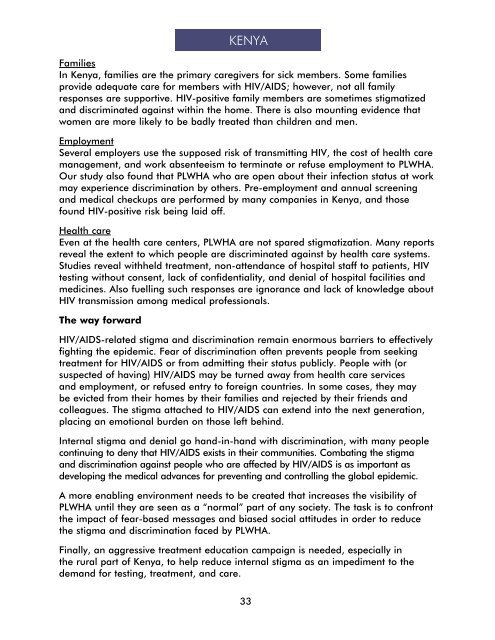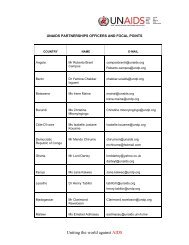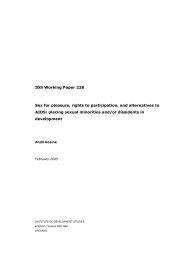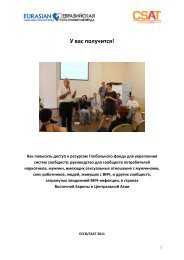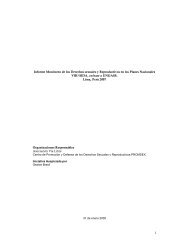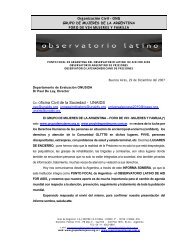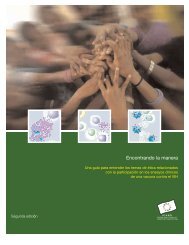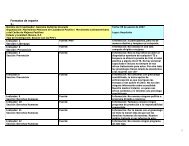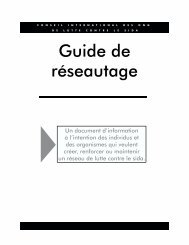FamiliesIn Kenya, families are <strong>the</strong> primary caregivers for sick members. Some familiesprovide adequate care for members with HIV/<strong>AIDS</strong>; however, not all familyresponses are supportive. HIV-positive family members are sometimes stigmatizedand discriminated against within <strong>the</strong> home. There is also mounting evidence thatwomen are more likely to be badly treated than children and men.EmploymentSeveral employers use <strong>the</strong> supposed risk of transmitting HIV, <strong>the</strong> cost of health caremanagement, and work absenteeism to terminate or refuse employment to PLWHA.Our study also found that PLWHA who are open about <strong>the</strong>ir infection status at workmay experience discrimination by o<strong>the</strong>rs. Pre-employment and annual screeningand medical checkups are performed by many companies in Kenya, and thosefound HIV-positive risk being laid off.Health careEven at <strong>the</strong> health care centers, PLWHA are not spared stigmatization. Many reportsreveal <strong>the</strong> extent to which people are discriminated against by health care systems.Studies reveal withheld treatment, non-attendance of hospital staff to patients, HIVtesting without consent, lack of confidentiality, and denial of hospital facilities andmedicines. Also fuelling such responses are ignorance and lack of knowledge aboutHIV transmission among medical professionals.The way forwardKENYAHIV/<strong>AIDS</strong>-related stigma and discrimination remain enormous barriers to effectivelyfighting <strong>the</strong> epidemic. Fear of discrimination often prevents people from seekingtreatment for HIV/<strong>AIDS</strong> or from admitting <strong>the</strong>ir status publicly. People with (orsuspected of having) HIV/<strong>AIDS</strong> may be turned away from health care servicesand employment, or refused entry to foreign countries. In some cases, <strong>the</strong>y maybe evicted from <strong>the</strong>ir homes by <strong>the</strong>ir families and rejected by <strong>the</strong>ir friends andcolleagues. The stigma attached to HIV/<strong>AIDS</strong> can extend into <strong>the</strong> next generation,placing an emotional burden on those left behind.Internal stigma and denial go hand-in-hand with discrimination, with many peoplecontinuing to deny that HIV/<strong>AIDS</strong> exists in <strong>the</strong>ir communities. Combating <strong>the</strong> stigmaand discrimination against people who are affected by HIV/<strong>AIDS</strong> is as important asdeveloping <strong>the</strong> medical advances for preventing and controlling <strong>the</strong> global epidemic.A more enabling environment needs to be created that increases <strong>the</strong> visibility ofPLWHA until <strong>the</strong>y are seen as a “normal” part of any society. The task is to confront<strong>the</strong> impact of fear-based messages and biased social attitudes in order to reduce<strong>the</strong> stigma and discrimination faced by PLWHA.Finally, an aggressive treatment education campaign is needed, especially in<strong>the</strong> rural part of Kenya, to help reduce internal stigma as an impediment to <strong>the</strong>demand for testing, treatment, and care.33
Waiting for second-line ART over?By Abraham KK, Celina D’Costa, Murali Shunmugam,Venkatesan Chakrapani, Indian Network for Peopleliving with HIV (INP+)According to estimates from India’s National <strong>AIDS</strong> ControlOrganization (NACO), about 2.47 million individuals in Indiawere living with HIV at <strong>the</strong> end of 2006, <strong>the</strong> third highestnumber in <strong>the</strong> world by country. 1 At <strong>the</strong> end of August 2007, a total of 100,572PLWHA—56,999 men, 32,038 women, 6,721 children, and 128 Hijras (transgenderindividuals who identify as women)—were receiving treatment through <strong>the</strong> 127ART centers supported by NACO. An additional 4,686 PLWHA were receivingART outside of <strong>the</strong> core public sector program. Global Fund assistance is directlyresponsible for ART provision to some 75,538 PLWHA through <strong>the</strong> public sector and2,207 in a separate program.<strong>Target</strong>s set at <strong>the</strong> end of <strong>the</strong> third phase of <strong>the</strong> National <strong>AIDS</strong> Control Programme(NACP-3) are for 300,000 adults and 40,000 children to be on ART in <strong>the</strong> publicsector by <strong>the</strong> end of 2012. The interim target, which has already been achieved,was to have 100,000 adults on ART through <strong>the</strong> public sector by <strong>the</strong> end of 2007.Status of previous key recommendations to NACO1. Develop a plan to provide second-line ARVs through <strong>the</strong> national ARTprogramFollow-up:Currently, all PLWHA (including children) in <strong>the</strong> national program areprovided only first-line ARVs; second-line ARVs are not currently available in<strong>the</strong> national program. The director-general of NACO has announced thatNACO would start providing second-line ARVs once <strong>the</strong> treatment accesstarget of 100,000 is reached. That target was reached by August 2007.During a meeting that month, NACO’s technical resource group on ARTdiscussed <strong>the</strong> technical and operational issues related to introduction ofsecond-line ARVs in <strong>the</strong> national ART program. As of October 2007, however,no concrete plan had been developed or made available. Just before <strong>the</strong>release of <strong>the</strong> report, NACO has announced that second-line ART will beintroduced in <strong>the</strong> national ART program in a phased manner. However, <strong>the</strong>details of <strong>the</strong> phased scale-up plan is still not publicly released.1 International Institute for Population Sciences (IIPS) and Macro International. National FamilyHealth Survey (NFHS-3), India: Key Findings. Mumbai: IIPS. 2007. http://www.nfhsindia.org/nfhs3_national_report.html34
- Page 1 and 2: Missing the Target #5:Improving AID
- Page 4 and 5: ArgentinaDr. María Lorena Di Giano
- Page 8 and 9: Executive SummaryAt the G8 meeting
- Page 12: • UN agencies should provide incr
- Page 16 and 17: Price should not be a barrier when
- Page 18 and 19: The Global Fund and UNITAID: The Fu
- Page 20 and 21: The real cost of free treatmentBy a
- Page 22 and 23: Remaining work for asuccessful prog
- Page 24 and 25: DOMINICAN REPUBLICto access rapid t
- Page 26 and 27: DOMINICAN REPUBLICIn Santo Domingo
- Page 28 and 29: ZIMBABWEtreatment, representing 35
- Page 30 and 31: ZIMBABWEAccording to the Medicines
- Page 32 and 33: ZIMBABWEZimbabwe’s application fo
- Page 34 and 35: ZIMBABWENational government• Addr
- Page 36 and 37: RUSSIAMigrantsRussia, with the seco
- Page 38 and 39: a person with HIV will die very qui
- Page 42 and 43: INDIA2. Provide pediatric formulati
- Page 44 and 45: Linking nutrition and treatmentBy W
- Page 46 and 47: Most people living with advanced HI
- Page 48 and 49: only available in the capital, Yaou
- Page 50 and 51: ZAMBIAFindings in particular provin
- Page 52 and 53: The DACA for Chadiza District was a
- Page 54 and 55: Many health care workers are inadeq
- Page 56 and 57: DRUG REGISTRATION BARRIERS & LOGJAM
- Page 58 and 59: Country ATV RLPV/rLPV/r(HS)TDFArgen
- Page 60 and 61: development and registration. Likew
- Page 62 and 63: Capacity issues and delays in the W
- Page 64 and 65: Lack of post-approval quality assur
- Page 66 and 67: ARV PROCUREMENT, REGISTRATION,AND S
- Page 68 and 69: ARGENTINAParallel importingRelating
- Page 70 and 71: ARGENTINAAccess to ARVsNo difficult
- Page 72 and 73: Viral load tests are available, but
- Page 74 and 75: Cambodiaby Mony PenOnly pharmacists
- Page 76 and 77: ChinaBy anonymous Missing the Targe
- Page 78 and 79: CHINAThe current process for regist
- Page 80 and 81: Dominican RepublicBy Eugene Schiff
- Page 82 and 83: IndiaBy Abraham KK, Celina D’Cost
- Page 84 and 85: MalawiBy Lot Nyirenda and Grace Bon
- Page 86 and 87: MALAWIStock-outsAccording to an ext
- Page 88 and 89: MoroccoBy Othman MelloukMorocco has
- Page 90 and 91:
Determine the patent status of all
- Page 92 and 93:
MOROCCOThe shortage occurred becaus
- Page 94 and 95:
As of November 2007, the unit cost
- Page 96 and 97:
NIGERIADiagnostic testsDiagnostic t
- Page 98 and 99:
The government’s initial inabilit
- Page 100 and 101:
Increase training and capacity buil
- Page 102 and 103:
treatment practice. The Minster ann
- Page 104 and 105:
Ugandaby Richard Hasunira, Prima Ka
- Page 106 and 107:
UGANDAExtracts from the MoH’s rep
- Page 108 and 109:
ZAMBIAIn gathering this information
- Page 110 and 111:
However, since manufacturing prices
- Page 112 and 113:
105SHORT SUMMARY
- Page 114:
PAKISTANAccess for marginalized gro


